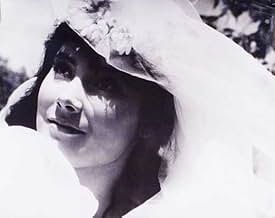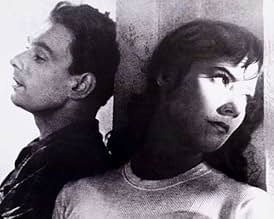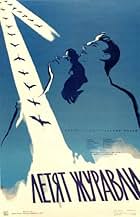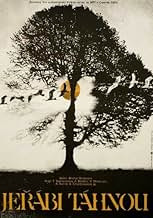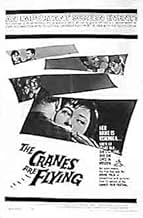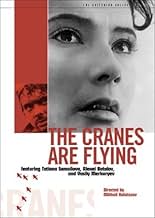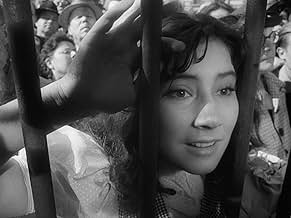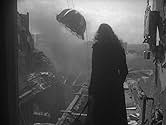Veronica planeja um encontro com seu amante, Boris, na margem do rio, apenas para que ele seja convocado para a Segunda Guerra Mundial logo depois.Veronica planeja um encontro com seu amante, Boris, na margem do rio, apenas para que ele seja convocado para a Segunda Guerra Mundial logo depois.Veronica planeja um encontro com seu amante, Boris, na margem do rio, apenas para que ele seja convocado para a Segunda Guerra Mundial logo depois.
- Direção
- Roteirista
- Artistas
- Indicado para 2 prêmios BAFTA
- 4 vitórias e 3 indicações no total
- Veronika
- (as T. Samoylova)
- Boris Fyodorovich Borozdin
- (as A. Batalov)
- Fyodor Ivanovich Borozdin
- (as V. Merkuryev)
- Mark Aleksandrovich Borozdin
- (as A. Shvorin)
- Irina Fyodorovna Borozdina
- (as S. Kharitonova)
- Volodya
- (as K. Nikitin)
- Stepan
- (as V. Zubkov)
- Varvara Kapitanova -babushka Borisa i Irina
- (as A. Bogdanova)
- Nikolay Chernov
- (as B. Kokovkin)
- Anna Mikhaylovna Lebedeva
- (as Ye. Kupriyanova)
- Lyuba
- (as V. Ananina)
- Soldatka
- (as V. Vladimirova)
- Dasha
- (as O. Dzisko)
- Sachkov
- (as L. Knyazev)
- Anatoliy Kuzmin
- (as Yu. Kulikov)
- Ranenyy
- (as D. Netrebin)
- Borya
- (as Sasha Popov)
- Antonina Monastyrskaya
- (as I. Preys)
Avaliações em destaque
The film's main plot, the love story, is tragic, but the film as a whole is as tragic in it's depiction of war and the immense effect it has on people. Through fine performances the cast bring another episode of war to life, with drama, joy, despair and hope. Director Mikhail Kalatozov achieves something else, a masterpiece of film making. The film contains some of the most remarkable camera work you'll likely to see in a pre-CGI film world. One of the early scenes where Boris runs up flights of stairs as the camera pans and follows in one take is a hint of things to come. That scene is mirrored when Veronika returns to her family apartment to find it bombed and runs up the same stairwell, that hangs among the ruins and fire. There are fine tracking shots, such as where Veronica runs along the dispatch area or when she runs along the train track. Another stand out scene is where Veronica is 'trapped' by the brother during an air raid, the noise loud, the camera angles obscure, the lighting jarred and ominous, it's a powerful moment, among many throughout the film.
The audience learns the fate of Boris way before Veronica, who tries to hang onto hope that he will return. Her love grows ever more when she discovers the note he left in the toy squirrel. The powerful end scenes, when the truth is revealed are stunningly effective, full of emotion and the horror of what war can create in people.
War films are often too busy concentrating on the battles itself, but occasionally a film will explore the real battle, the one that humanity has to endure on a personal level.
More of my reviews at iheartfilms.weebly.com
Nonetheless, we haven't seen it filmed this well, with bold shots that take liberties to emphasize separation, or destruction, or hopelessness. All the more remarkable coming from the Soviet Union, and reason to conclude that Tarkovsky is not the last word in modern-era Soviet cinema.
I was reading Chekhov's "Three Sisters" the other day, and chanced upon what may be the meaning of the title of this film. In Act 2, Masha objects to the notion that we must live our lives without meaning or understanding:
"MASHA: Surely mankind must believe in something, or at least seek for the truth, otherwise life is just emptiness, emptiness. To live and not to know why the cranes are flying, why children are born, why there are stars in the sky. Either you must know why it is you live, or everything is trivial - mere pointless nonsense."
Likewise, Veronika has a hard time believing that the war, and her and others' sufferings, have been pointless. Better to assign a meaning, to live as if one's life is significant, and not to give in to despair. It is perhaps this thinking that prompts her to her final act in the film.
BTW as a minor correction to one other comment here--there may be a pattern of V's in the film, though I hadn't noticed them myself. But the first letter of Veronika's name is not a further instance of this; in the Cyrillic alphabet, her name begins with a letter which looks like an English "B".
Enjoy it.
Você sabia?
- CuriosidadesOne of the most notable features of the film is cinematographer Sergey Urusevskiy's then ground-breaking use of hand-held cameras. He had learned how to film like this when he was a military cameraman during the war.
- Citações
Stepan: Dear mother, father, sisters and brothers! The happiness of our reunion is immeasurable. The heart of every Soviet citizen is filled with joy. Joy sings in our hearts. It is victory that has brought us this joy. We have all waited for this moment. But we shall not forget those left behind on the battlefield. Time will pass. Towns and villages will be rebuilt. Our wounds will heal. But our fierce hatred of war will never diminish. We share the grief of those who cannot meet their loved ones today, and we will do everything to insure that sweethearts are never again parted by war, that mothers need never again fear for their children's lives, that fathers need never again choke back hidden tears. We have won, and we shall live not to destroy, but to build a new life!
- ConexõesEdited into Nitrato d'argento (1996)
Principais escolhas
- How long is The Cranes Are Flying?Fornecido pela Alexa
Detalhes
- Data de lançamento
- País de origem
- Central de atendimento oficial
- Idioma
- Também conhecido como
- The Cranes Are Flying
- Locações de filme
- Mosfilm Studios, Moscou, Rússia(Studio)
- Empresa de produção
- Consulte mais créditos da empresa na IMDbPro
Bilheteria
- Faturamento bruto nos EUA e Canadá
- US$ 17.923
- Faturamento bruto mundial
- US$ 32.549
- Tempo de duração1 hora 35 minutos
- Cor
- Mixagem de som
- Proporção
- 1.37 : 1
Contribua para esta página


